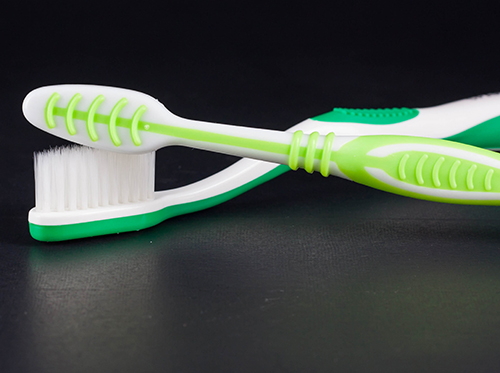June 14th, 2017

If your child participates in sports or other physical activities, it’s wise to consider getting a mouthguard. Also known as mouth protectors, mouthguards are a device worn over the teeth to lessen the impact of a blow to the face.
This reduces the chance that your child might lose teeth or sustain other serious oral injuries. We recommend that all patients involved in a contact sport such as wrestling, football, or hockey wear a mouthguard because of the high risk of such injuries.
However, anyone involved in a physically demanding sport or activity should wear a mouthguard as well.
Can you imagine what it would be like to lose a few of your front teeth? The way you talk, eat, and smile would all change.
Injuries that can be sustained when not wearing a mouthguard include:
- Chipped and broken teeth
- Fractured jaws
- Root damage
- Concussions
- Injury to the lips, cheeks, or gums
Types of Mouthguards
There are three different types of mouthguards — typically made of a soft plastic material or laminate. You can decide which works best for your child in terms of budget, fit, and comfort.
- Stock mouthguards are prefabricated to a standard size. They offer adequate protection, but you need to find one that fits your child properly and comfortably. Stock mouthguards are readily available at department stores, sporting goods stores, and online.
- Boil-and-bite mouthguards are placed in boiling water to soften them, then into the mouth so they can conform to the shape of the teeth. Boil-and-bite mouthguards are more expensive, but offer a more customized fit than stock ones. You can find these in department stores, pharmacies, sporting goods stores, and online.
- Custom-made mouthguards are created just for your child by Dr. Stephen Korson. These offer the best fit and comfort of all the options, but they are also the most expensive. Ask a member of our Summit, NJ team for more information.
The American Dental Association says a good mouthguard should be easy to clean, fit properly, be comfortable, and resist tearing or damage. It shouldn’t restrict speech or breathing.
Still not sure if your child needs a mouthguard or which kind is right for his or her smile? Ask Dr. Stephen Korson or one of our staff members for more information.
June 7th, 2017

Did you know that the most common oral health diseases are tooth decay and gum disease? Not so coincidentally, they are also the easiest to prevent. As much as we would like for the brushing and flossing to do all the work for us, in reality, we really are what we eat — and a healthy diet is just as important for dental health as it is for the rest of the body.
Eating well boosts your immune system, and makes you less susceptible to gum disease and tooth decay. When you maintain a balanced diet, you provide your body with all the nutrients it needs to succeed. So what does a healthy, balanced diet entail? It’s really quite simple. Here are some tips:
- Focus on lean meats, veggies, whole grains, and healthy fats.
- Limit your intake of sugary drinks like energy drinks and soda.
- Keep your sweet tooth in check.
- Beware of acidic meals and snacks that are high in salt and sodium.
- Drink lots of water.
Unfortunately, there’s no “one size fits all,” magic diet that will automatically improve your oral health, but following the five guidelines above as best you can is a great way to start. Food and drinks that are high in sugar or acidity weaken your enamel, stain your teeth, and make you more likely to develop a cavity or gum disease.
At Summit Pediatric Dentistry, we like to encourage our patients to drink a lot of water during the day. Doing so not only keeps you hydrated, but also helps rinse out the sugar and acid from various things you’ve consumed during the day.
If you think your diet might be affecting your smile, come pay Dr. Stephen Korson a visit or give our Summit, NJ office a call! We’re always happy to answer your questions.
May 11th, 2016

Have you ever thought about how you're cleaning and storing your toothbrush when you're not using it? Did you know that the way you store your toothbrush could have an affect on your oral health? In this post, we'll look at some steps you can take to maximize toothbrush cleanliness and minimize bacteria.
Below are some tips from Dr. Stephen Korson for toothbrush use and storage:
- Don't share your toothbrush – This may seem obvious, but sharing a toothbrush exposes both users to bacteria and microorganisms from the other user, which can increase chances of infection. You should also avoid storing your toothbrush in the same container as other people’s toothbrushes.
- Thoroughly rinse your toothbrush after each use – Rinsing your toothbrush well under running water will help remove food particles, toothpaste, and other debris from the bristles of your brush.
- Store your toothbrush in an open-air container not a sealed one – Putting a wet toothbrush in a sealed container creates a favorable environment for microorganisms and bacteria.
- Soak your toothbrush in an antibacterial mouthwash after use – There is some evidence to suggest that soaking your toothbrush in an antibacterial solution may reduce the amount of bacteria present on the toothbrush.
- Change your toothbrush every three months – The bristles of your toothbrush become less effective and frayed after repeated use so it's a good idea to replace it on a regular basis. It's also wise to replace it after you've been sick.
There are many simple things you can do to make your oral-care regimen as clean as possible. Use common sense when storing your toothbrush—don't put it in a dirty place like the edge of your sink or in the shower (please, not by the toilet!), and keep it upright in a cool dry place—and you're usually good to go. If your toothbrush is looking a little worse for wear, drop by our Summit, NJ office and we'll be glad to provide you with a new one!
May 4th, 2016

Summer is almost here, which means a season full of vacations, adventures and great memories is just around the corner for our patients at Summit Pediatric Dentistry.
Everyone wants a glowing and radiant white smile when the sun comes around and we have a few reminders to keep your pearly whites healthy and beautiful over the summer! Try to stay away from drinks that will stain your teeth like coffee, soft drinks, or dark colored juices. Not only will drinks like this weaken your enamel but they will also darken that fabulous smile you're working on! Another tip is to try and focus on brushing your teeth; everyone knows that when busy schedules start picking up, getting a good brushing session in tends to take the backseat! A good tip for keeping your mouth safe from staining and other possible pitfalls is to rinse your mouth with water after any meal you can’t fully brush your teeth after. Your teeth, inside and out, will benefit!
And remember, whether you are headed to a barbecue, a camping trip, or just having fun in the backyard this summer, we want to hear all about it! Make sure to let us know what you’re up to below or on our Facebook page! We also encourage you to post any photos from your adventures!







